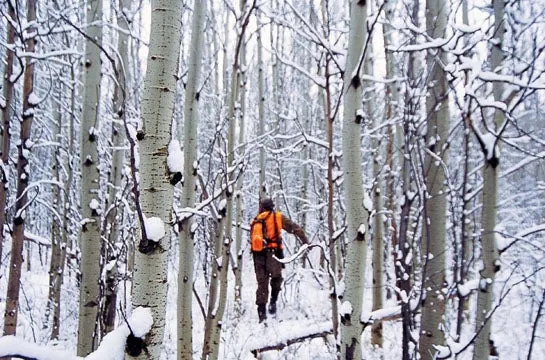The elk gave you the slip an hour ago, vanished into some distant dark timber. The sun, sinking fast, dropped behind a solid bank of cloud cover, and the temperature is plummeting. Sure you’re walking South, you stop, look around. Didn’t you pass that lightening-cleaved pine 20 minutes ago? You check you compass, again. It says North. But you’re thinking, “No way!”
Face it. You’re lost.
Do you know what to do next? Should you stay put or keep walking. Can you choose the right camping spot, make a fire, find the North Star, signal for help? In short, can you survive? Take this 12-question quiz to see if you would make the right decision to save your own life.
1) You’re hunting in unfamiliar wilderness, and you’re concerned about getting lost. You’ll be able to find your way to safety as long as you can orient your position with respect to which of the following guideposts:[ A ] A prominent peak, pond or other feature of land marked on the map[ B ] A baseline such as a road or river[ C ] A trailhead or parking lot[ D ] The sun
2) You become aware that you have lost your bearings. Your first step is to:[ A ] Stop walking and immediately make camp[ B ] Follow the nearest watercourse in a downstream direction[ C ] Gain a ridgetop for a vantage[ D ] Mark your position and try to navigate back to the last place that seemed familiar
3) You know that a calm, clear-thinking head is your most important survival tool, and recognizing the first stages of panic can help you regroup and focus. What behavior is a sure indication that you’re losing your cool?[ A ] Walking in a circle[ B ] Breaking into a trot[ C ] Dropping your rifle and pack so you can move more freely[ D ] Turning downhill to find a creekbottom to lead you to safety
4) Even if you’re lost, you can fix your position on a topographic map as long as you can do which of the following things:[ A ] See two landmarks marked on the map[ B ] See one landmark marked on the map and orient your compass with respect to the sun[ C ] Estimate your pace, direction, and time traveled from a fixed location on the map[ D ] Take a bearing with your compass to a prominent landmark marked on the map**5) You’re definitely lost, and it’s getting dark. Which camping spot will be the warmest once the sun goes down?**[ A ] A forested south slope[ B ] A forested north slope[ C ] An open south slope[ D ] A creekbottom
6) The weather is bad, and you only have matches. Which of the following natural fine kindlings will not reliably ignite?[ A ] Hardened resin blisters found on the trunks of spruce and pine trees[ B ] The lichen commonly known as Old Man’s Beard[ C ] Shredded birch bark[ D ] Shaved inner bark from a poplar tree[ E ] Dry grass
7) You’ve been lost for hours and are growing hungry and weak. You’re spending the night without a fire, and in your pack you have an energy bar, an apple, and a stick of salami. Which should you eat first?[ A ] Energy bar[ B ] Apple[ C ] Salami
8) The temperature plummets, and you have nothing left in your daypack to put on. What is the lightest-weight garment that you could have brought that would significantly conserve the heat your body generates?[ A ] Down vest[ B ] Wind shirt[ C ] Wool union suit
9) As you suffer through the night, you look to the heavens for help. You know that the North Star is the most reliable directional signpost in nature, but how do you find it?[ A ] It is the last star on the ladle of Ursa Major, the Big Dipper.[ B ] It is the first star on the handle of Ursa Major, the Big Dipper.[ C ] It is located beyond the Big Dipper, in the direction where the last two stars of the ladle point.[ D ] It is the first star on the handle of Ursa Minor, the Little -Dipper.[ E ] Except for planets, it is the brightest star in the northern hemisphere.
10) You made it through the night, but you’re still lost. You have to make a decision: Should you stay where you are, signal for help, and wait for rescue; or try to hike to safety? The answer depends on which of the following factors:[ A ] The likelihood of your being missed and searched for[ B ] Your knowledge of the surrounding area[ C ] The ruggedness of the terrain[ D ] Your level of survival skills[ E ] Impending changes in weather
11) Hypothermia is the No. 1 killer of sportsmen and the biggest threat to your survival. Which of the following signs should you look for as an early warning that you may be hypothermic?[ A ] Profuse sweating even in very cold temperatures[ B ] Being unable to accurately touch your thumb to the little finger of the same hand[ C ] Poor vision[ D ] Confusion[ E ] Slow reflex time
12) Where are searchers most likely to pick up a track by which they can identify you after you are reported missing?[ A ] On the trail you used to go hunting[ B ] Within 3 feet of your vehicle[ C ] Within the specific area you said you’d be hunting[ D ] On the floor mat of your vehicle


